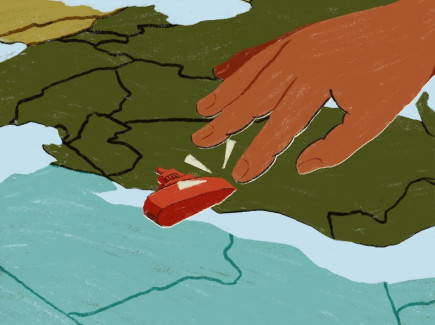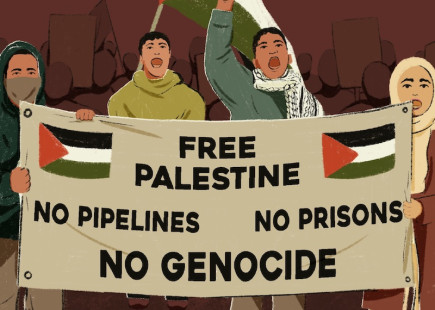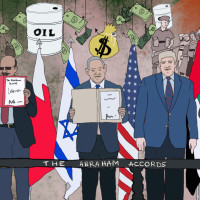Pipeline to genocide BP’s oil route to Israel
Over the past 10 months, we have witnessed the most televised genocide in history, as Israeli forces raze Gaza's infrastructure, from schools to hospitals. But these weapons of destruction don't appear spontaneously; they are powered by global energy supply chains. Understanding these connections reveals how energy corporations fuel the machinery of war, serving as the lifeblood of imperialist agendas.
This investigation was carried out between shado and EEFP over a 4 month period, made possible thanks to the support of the Guerrilla Foundation.

Illustration by Heedayah Lockman
Over the past 10 months, we have borne witness to the most televised and evidenced genocide in human history. Israel’s military jets and vehicles have been live streamed razing to the ground all infrastructure that makes life possible in Gaza – from schools to hospitals, and even the desecration of cemeteries.1
But, these forces of destruction do not appear spontaneously. They are fitted with parts from arms factories around the world, and fuelled with oil from global reservoirs.
And so, it becomes paramount to follow the energy supply chains from the point of extraction to their point of use in Israeli military vehicles. If we understand that “[weapons manufacturers] are the fists of US imperialism, just as logistics companies are its sinews,” then energy corporations provide this death machine its oxygen.
BP’s gas licences
Israel receives this oxygen from a diversity of sources. In November 2023, news broke that a number of Western energy companies, including British Petroleum (BP), were granted gas exploration licences in occupied Palestinian waters by the Israeli Ministry of Energy. While it will take years before these sites are converted into reliable sources of gas, activist groups in the US and Britain have protested these business deals, brokered in the shadow of an ongoing genocide.
The motivation for Israel’s genocidal, Western-backed siege on Gaza cannot be reduced to the exploitation of its marine gas fields. The ongoing genocide should be understood as part of the logic of US imperialism and its proxy state which enacts its interests in the region: the Zionist settler colonial project, which seeks to ethnically cleanse all of historic Palestine, seize natural resources, and use and export its fuel supplies for the consolidation of its military and economic power.
Indeed, our protests against BP’s gas licences are not in isolation. Like other activist groups in Turkey and Colombia, we campaign against energy companies partnering with Israeli businesses to supply fuel to Israel.
For this reason, we situate BP’s gas licence within its larger role in fuelling Israel. BP is the operator and largest shareholder of the Baku-Tbilisi-Ceyhan (BTC) oil pipeline, which is supplying Israel with 28% of its oil during its genocide.
In this investigation we explore BP’s colonial history and the supply chain of the BTC pipeline. We also delve into the social licences that facilitate BP’s operations abroad. Social licences are a commercial and metaphorical concept describing corporations' process of acquiring public approval as an added layer of legitimacy for their ongoing profit-driven, colonial business practices.
Focusing on the BTC pipeline reveals how Zionist settler-colonialism is central to the continued extraction of oil in the Middle East, and global uneven accumulation, where wealth is concentrated in the Global North.
The liberation of Palestine and regional anti-Zionist resistance must therefore be central to the larger struggle against capitalism and for a just transition. Organising from the imperial core against the Zionist occupation of Palestine then becomes about much more than just holding the perpetrators of genocide to account. It is part of the bigger fight against imperialism – which exterminates populations and ecologies for the continued flow of value to the Global North.
Energy and imperialism: an introduction to BP
The history of BP and its colonial extraction of oil, labour exploitation, and coup orchestration is crucial to understanding the role of energy in the imperialist system.
The oil industry in the Middle East began with a concession signed in 1901 that gave British financiers the exclusive right to search for oil in the Khuzestan Province in South West Iran. In the lead-up to the First World War, many European powers started the transition from coal to oil to accelerate their industrial development and colonial expansion into Africa and Asia. The Anglo-Persian Oil Company (APOC), now known as BP, was eventually registered in 1909 once oil was found and extracted from the Khuzestan Province.
In 1914, as urged by Churchill, the British government acquired a majority interest share in BP – an investment that enabled the British Royal Navy to undergo an energy transition from coal to oil.
From the outset, the interests of BP were tied to the interests of the British state. As profits from the oil business increased, the British state became wealthier. At the same time oil was being used to fuel Britain’s imperialist militarisation and colonial ventures, and in return, military aggression was used to secure oil reserves across the world.
As BP expanded its operations across the Middle East, opposition to British exploitation grew. In 1953, the US and Britain orchestrated a coup to remove the democratically-elected Prime Minister of Iran, Mohammad Mossadeq, who wanted to nationalise APOC.
The 1953 coup and subsequent consolidation of Mohammad Reza Pahlavi’s power resulted in BP securing 40% of Iran’s oil until the 1979 Revolution. For this period, the Shah enacted British imperial interests in the region, undermining Arab and Iranian anti-imperialist liberation struggles.
BP’s intrinsic role in British industrial development signifies how British standards of living were predicated on the “cheap Iranian oil” extracted from Khuzestan. This oil was used to fuel buses, cars, and factories whilst also maintaining Britain’s violent imperial rule in their colonies, including but not limited to South Africa, Palestine, Ireland, Kenya and Cyprus.
In the latter half of the century, despite BP eventually becoming a wholly privatised corporation, the close relationship between state and company remained strong. The weight of British and US state involvement in getting the BTC pipeline project off the ground was monumental. Following the collapse of the USSR in 1991, BP wasted no time to capitalise on their preparation for this moment. The company quickly moved to strengthen its grip over the newly independent Azerbaijan – a nation in transition, moving towards a global capitalist market.
In 1992, Margaret Thatcher visited Azerbaijan upon the request of BP to cement ties between the burgeoning state and Britain. As former BP CEO John Browne recounts, “[it] was essential for us to be closely aligned with the UK government, as post-Soviet countries still found it easier to understand and accept government-to-government dealings.” Britain’s state endorsement of a project or potential deal was another negotiation tactic for BP to make the most of.
The US’s aggressive push for its presence to be felt in the Central Asian region also resulted in the creation of the US “Coordination Group on Caspian Energy” in 1998, which included governmental representatives and the CIA. This group met every three weeks to detail the short-term strategic plans required “to push both the oil companies and the governments of Azerbaijan, Georgia and Turkey to build the pipeline that the US demanded.”
The commitment of Britain and the US to both influence the strategic direction of the pipeline project in their favour, and to establish Azerbaijan as a client state monitoring the threats of Russia and Iran, sits within a long tradition of private companies aligning with (and shaping) the imperial interests of the US and Britain. This geopolitical reality forms the backdrop of the context we see today: Azerbaijan, firmly aligned to Western interests, fuelling a genocide committed by Israel, another imperial outpost in the region.
“Contract of the century”: foundations for a transnational pipeline
To understand the interests at play in the BTC pipeline’s supply of crude oil to Israel, it’s important to understand the agreements made between Azerbaijan and BP in the 1990s. These documents set in stone the continuation of BP’s dominance over ‘sovereign’ nations in the Global South.
The foundational agreement for the BTC pipeline was the $7.4 billion “Contract of the Century” brokered by Azerbaijan’s government and Western energy companies in 1994. The deal’s boastful title was intentionally adopted by those involved to reflect its value and the scale of the developments it unleashed.
The contract detailed how Azerbaijan’s three major oil fields in the Caspian Sea – known collectively as the ACG oil fields – would be developed by SOCAR (the State Oil Company of the Republic of Azerbaijan), with major assistance from international energy companies. The hydrocarbons produced from the oil fields would then be sold for profit. Initially, most of the profits would go to the international energy companies who built these systems so they could recuperate the development costs and maximise their own margins.
The contract bound Azerbaijan to a consortium of 11 foreign energy companies representing six nations: US, UK, Russia, Norway, Turkey and Saudi Arabia. SOCAR’s marriage to foreign energy companies was formalised by the creation of the AIOC (Azerbaijan International Operating Company), which became responsible for overseeing the implementation of the oil project.
By 1998, BP had a controlling 30.37% share of AIOC and was the Operator of the ACG platforms. To this day, BP’s regional president of operations in Azerbaijan, Turkey and Georgia, is also the president of AIOC.
The BTC pipeline now runs through three nations: Azerbaijan, Georgia and Turkey. This was made possible after the BP-led energy consortium established private legal contracts with each nation.
Each contract was drawn up by Baker Botts, an American law firm, as contracted by BP. Baker Botts prioritised the free movement of oil above all and through a series of “stabilisation clauses” locked in the future exploitation of the Caspian Sea oil as an immovable, legal fact for a 40 year period. These clauses were devised specifically to protect shareholders from any internal political changes or other potentially adverse events that could alter the much required stability in the three countries that BP and those profiting so heavily depend on.
The significance of these agreements cannot be understated. BP’s terms still override local laws on issues of public health, land acquisition, tax, environmental regulations and security of the pipeline. The erosion of each nation’s political sovereignty is symptomatic of BP’s colonial history, with those in the industry referring to the “BP Country of Azerbaijan”. This label exposes the interplay between private and state actors.
The trade of oil and the energy supply chains that expand across the globe are often deliberately fragmented and obscured. By grounding our analysis in the agreements secured by the BP-led energy consortium we can make plain who is behind the key infrastructure that Israel depends on to sustain their ongoing genocide of Palestinians.
Tracking the BTC pipeline
Operating 3000 miles away from its London headquarters, BP is embedded in every step of the crude oil supply chain to the Zionist genocide, from extraction in the Caspian Sea, to transportation across transnational territories.
The supply chain begins at the ACG oil fields in the Caspian Sea, off the coast of Azerbaijan’s capital city, Baku. These are Azerbaijan’s largest oil reserves and are the main source of feedstock for the BTC pipeline. Despite being located in Azerbaijani territorial waters, a British-based subsidiary of BP operates the oil fields.
Crude oil from the ACG fields then flows through subsea pipelines to the Sangachal terminal near Baku. Here, the oil is received and stored. This is the first stop of the BTC pipeline, connecting Azerbaijani oil (commercially referred to as Azeri Light or Azeri crude oil) with the world market. The Sangachal terminal is also majority owned and operated by BP.
1,099 miles long, the BTC pipeline crosses international borders between Azerbaijan, Georgia and Turkey. The pipeline has devastated local villages, cuts through Kurdish lands and its path is highly militarised. It has capacity to transport 1.2 million barrels of crude oil everyday, from the Caspian to the Mediterranean sea.
The pipeline terminates at the Turkish port of Ceyhan. The Turkish section of the BTC pipeline is operated by BOTAS, Turkey’s state oil company. Here, the supply chain then moves from land to sea.
The oil is transported along shipping routes via oil tankers. Various oil and shipping companies are contracted to transport the oil overseas. The predominantly Swiss companies that have chartered ships to transport oil from Ceyhan to Israel since October 2023 are Oilmar (UAE), Petraco (Switzerland), SOCAR (Azerbaijan), Vitol (Switzerland) and Glencore (Switzerland).
- The oil tankers arrive at their final destination on occupied Palestinian land, terminating at the “Israeli” ports of Ashkelon, Ashdod and Haifa. Ashkelon, only about 12 miles north of Gaza, is the primary destination for Azeri BTC crude oil, and was out of service for months following October 2023 due to frequent rocket attacks from the Palestinian resistance.
The offshore trade route from Turkey is crucial for Israel’s oil supply and its disruption is an existential threat to the Zionist project. Due to Israel’s geopolitical isolation on land, it is entirely reliant on marine imports. The threat that the Zionist expansionist project represents to the sovereignty of neighbouring states means that there are no pipelines that directly deliver fuel supplies over land. This represents a serious geopolitical vulnerability and a weakness that countries like Yemen have tactfully exploited.
By exercising naval control over their national maritime borders in the Red Sea, Yemen has disrupted oil shipments destined for the Southern Israeli port of Eilat, which is now “in a state of bankruptcy" following Yemen’s Ansar Allah’s blockade.
As an imperial outpost, Israel relies on its relationships with other regimes that are allied with Western imperialism. In 1961, Israel cultivated strong alliances with non-Arab states, including Iran, Ethiopia and Turkey, with the attempt to encircle the Arab world. Azerbaijan’s strong relationship with Israel can be viewed in this tradition. The benefits also go both ways: while Azerbaijan provides oil, Israel has supplied Azerbaijan with nearly 70% of its military arsenal to invade Armenia. Oil and militarism go hand in hand to facilitate dispossession and ethnic cleansing for imperialist-aligned states.

Illustration by Heedayah Lockman
Pipeline to colonial genocide
Once Azeri crude oil reaches Ashkelon, it is transported to the Ashdod refinery via the Ashkelon-Haifa pipeline. The refinery is owned by Paz Oil, who in their 2023 Q3 report, stated that “immediately after the war began, the Company started donating food, fuels and other products needed by the IDF and those evacuated from their homes in the frontline.” Not only has the refinery been a site of jet fuel production for the Israeli military, but it has also been “donating” fuel towards the genocide efforts. The refinery’s reports also detail that over 50% of its outputs are diesel and naphtha, which have extensive military uses. Since the refinery already has one contract with the IDF for supplying jet fuel, it would be unsurprising if it had undisclosed contracts for other fuels.
The evidence is damning – Azerbaijani oil extracted and transported by BP via the BTC pipeline is refined in Israel into jet fuel for the military forces committing a genocide in Gaza.
This has serious consequences for all actors involved, from BP to SOCAR, to the Turkish authorities, particularly in light of South Africa’s proceedings at the International Court of Justice (ICJ) which declared plausibility in Israel’s genocide in Gaza.
Although Azeri crude oil is being used by the Israeli military, a clear line cannot be drawn between civilian and military infrastructure in a settler colonial military state. Israel is a small country with a disproportionately large army, meaning that there is heavy overlap and blurring of civilian and military fuel supply chains. Our own review of Paz Oil’s 2024 Q1 report reveals that the company’s Aviation Services subsidiary, which has a contract for refuelling Israeli Air Force jets, is listed under the heading “Energy for Transportation”, alongside civilian fuel needs.
Settler colonial projects are violent military projects by definition and function, since both their establishment and maintenance depends on the expulsion and subjugation of the native via force and coercion. A settler society is a military and militarised society, best exemplified by the mandatory conscription of the Israeli settler population into the occupation forces, and the images circulated of the military tanks refueling at “civilian” petrol stations during the genocide.
For this reason there becomes no distinction – every drop of crude oil arriving on Israeli soil can be considered as fuel for the genocide in Gaza. Genocide is not a side effect of Zionism nor a result of extremist political currents within Israel, but a core function of its type of settler colonialism, premised on the annihilation of the native population as evidenced in the Nakba ongoing since 1948.
Within the global climate movement, our focus must shift towards the concrete uses of fuel, not simply its sources or points of extraction. But examining the uses of energy in Israel must not be restricted to the genocide and ecocide in Gaza. The private actors fueling Israel are also fueling its expansionist project and its encroachment on the sovereign territories of neighbouring states such as Lebanon and Syria, which has been under Israeli bombing and military occupation.
And so we cannot ignore BP’s oil pipelines – that are masterminded and operationalised on British soil – when they are contributing to genocide.
BP is responsible; BP is guilty. BP must be forced to stop supplying fuel to the genocidal Zionist entity. And while the supply chain for the BTC pipeline begins in Azerbaijan, all of BP’s business is supposedly carried out with the consent and support of the British public.

Illustration by Heedayah Lockman
Fabricating legitimacy: BP’s political lobbying and social licence to operate
In tracking the supply chain from Azerbaijan to Israel through the BTC pipeline and the marine shipments of BP’s oil to Israel, we recognise how political lobbying and BP’s social licences are also an integral part to this supply chain.
As investigated by Declassified, BP’s biggest exploration licences – including in Iraq, Nigeria, Venezuela and Libya – have been obtained through driving British support for neo-colonial wars in those countries and conspiring with the MI6.
As one relevant example, the MI6 was reportedly involved in the two coups of 1992 and 1993 in Azerbaijan that catalysed the rise of Heydar Aliyev, Azerbaijan’s President who oversaw the “Contract of the Century” which led to the BTC pipeline. From 2015 to 2022, Sir John Sawers, former head of MI6, even sat on BP’s board.
When Sawers’ appointment was announced, it became evident that BP was relying on the intelligence and diplomacy experience of the former special representative for Britain in Iraq, deepening the extensive crossover between BP and the British establishment.
More recently, BP has concealed lucrative, multi-million dollar deals with little scrutiny by lobbying former and current British MPs. Most notably Stephen Crabb, former MP and parliamentary chairman of Conservative Friends of Israel was given Wimbledon tickets by BP in July 2022 just five months before Israel organised the tender for gas exploration licences in Gaza in December 2022. We can only speculate as to the purpose of Crabb’s attendance as BP’s guest, however, it reveals the secretive and intimate dealings between BP and British state actors.
The normalisation of government figures being wined and dined by oil companies shows how Britain’s political establishment, whether Tory or Labour, is equally as open to the tempting, corrupting and clandestine lobbying offers of big business.
Beyond the corridors of Westminster, BP also entrenches itself into our everyday lives through its social licence to operate, bolstering its influence within society at large.
In BP’s own words, this social licence is important because it “makes people buy our products, apply for our vacancies, invest in our shares, or accept our presence in their communities.” Generating widespread acceptance of an image of their company as a force for good is vital for the formulation of BP as a legitimate enterprise.
A key event that illustrates the role of social licences in risk management within the supply chain is BP’s 2010 Deepwater Horizon oil spill in the Gulf of Mexico. This explosion resulted in mass chemical poisoning of residents, the death of 11 workers, and years of damage to marine life. Despite initial costs, there was no impact on BP’s long term stock market performance.
Following the oil spill, BP sponsored a 10-year research and community engagement project entitled the “Gulf of Mexico Research Initiative” in an attempt to reconstruct its legitimacy and regain its social and political licences.
Through the initiative, scientists handpicked by BP framed its oil extraction as necessary for a functioning society, and failed to mention ‘climate change’ even once during the delivery of the synthesis publications used in community outreach. This demonstrates BP’s reliance on universities and scientists to shape public narratives and market BP-made catastrophes as unavoidable accidents.
Companies frequently use their social licence to take the lead in global expansion, acting as key players of empire rather than simply doing the dirty work of states. It is essential that our movements begin to move towards strategies that frame corporations at the heart of empire in this way.
In mainstream academic and tactical discourse, fuel supply chains are viewed in their physical form, from the extraction through to the tracking of jet fuel and where it docks. While this is correct and an important aspect of adding pressure to wherever jet fuel lands, it neglects the role of the social licence.
Manufactured consent through social licensing exists in every part of the supply chain. University scholarships and career fairs supply BP with young undergraduates turned petroleum and pipeline engineers who work at the point of extraction, to Arts, Museum and sports sponsorships that act as a playground for BP to woo foreign governments for drilling permits. Targeting social licences in the imperial core, where this genocide is fuelled, allows us to revoke our consent from all points of the supply chain.

A just transition from below
In November 2024, leaders from across the world will gather in Baku, Azerbaijan’s capital, for the 29th iteration of the annual climate summit, COP29. This masquerade of climate talks will predictably dominate Western media headlines and is already being framed as a “bridge between the wealthy global north and poor global south.” But we know this event has been decades in the making.
It would not be possible without the “Contract of the Century”, BP’s heavy involvement, or the US’ aggressive push for their interests to be materialised through the BTC pipeline.
Fittingly, Azerbaijan’s Energy minister, who will oversee COP29, has more experience working for SOCAR than as a politician. In addition, it is no shock that the war criminal and former British Prime Minister Tony Blair, whose corruption in Iraq led to BP being nicknamed “Blair Petroleum”, also wants to help run the climate summit.
It is also no coincidence that COP29 will take place in Baku at a time when the country’s oil and gas industry is on the cusp of further expansion. As the UAE did with COP28, the host country will use this failed institution as an opportunity to strengthen relations for striking new fossil fuel deals. Azerbaijan and BP’s plans for energy extraction show no signs of slowing down.
On the contrary, their oil extraction deal was extended in 2017 to end in 2049. Billions worth of investment continue to pour into this already immense energy project. And this continued collaboration extends to Israel, as it is only within this context that we can fully comprehend how BP and SOCAR were jointly awarded a gas exploration licence offshore of Israel in November 2023.
Though heralded as a feat of progress, the BTC pipeline has been subjected to resistance by Kurdish groups and Palestine solidarity activists since its establishment. In Turkey, Filistin Icin 1000 Genc (A Thousand Youth for Palestine) have campaigned outside of SOCAR offices and disrupted operations numerous times. In Britain, we have organised mass mobilisations targeting BP’s social licence generated through commercial partnerships and have worked with the student, labour, and climate movements to pressure for an energy embargo from below.
The connection we make between the pipeline and Palestine is not simply a result of supply chain mechanics. The Middle East and Caspian Region are responsible for producing around 40% of the world’s oil. Israel is a cornerstone of Western imperialist interests in the region and has historically played a counter-revolutionary role to secure the flows of fossil fuels and safeguard capital accumulation.
Dismantling Zionism is therefore a prerequisite for dismantling a system that relies on fossil fuel extraction for endless capital accumulation.
Beyond fossil fuels, we also see Israel engaging in the politics of a green transition to expand its control over the production of renewable energy across occupied Palestine. A free Palestine must be at the core of our emancipatory climate politics, because a just transition is antithetical to the logics of settler-colonialism and capitalist-imperialism.
By exploring the supply chain, we have identified points of disruption: from BP and SOCAR’s social licences, ports and terminals, the upcoming COP in Azerbaijan, and the BTC pipeline itself. Almost one year into the Zionist genocide, the urgency of building an organised movement that can strategically coordinate and disrupt BP’s supply chain at each step has never been clearer.
Further resources and reading suggestions
Energy Embargo for Palestine's Instagram and X pages
The Palestinian Youth Movement’s Mask off Maersk campaign
Palestine
- TNI's Palestine reading list
- Two Logics of War: Liberation against Genocide, Bikrum Gil
- Zionist Colonialism in Palestine, Fayez Sayegh
- Andreas Malm The Destruction of Palestine is the Destruction of the Earth
